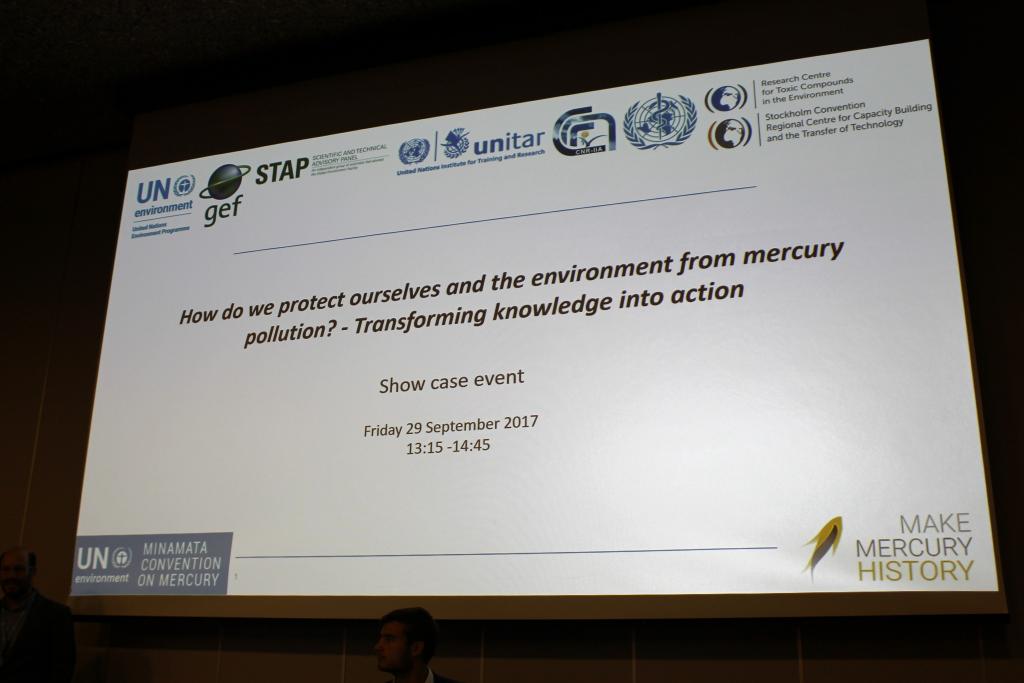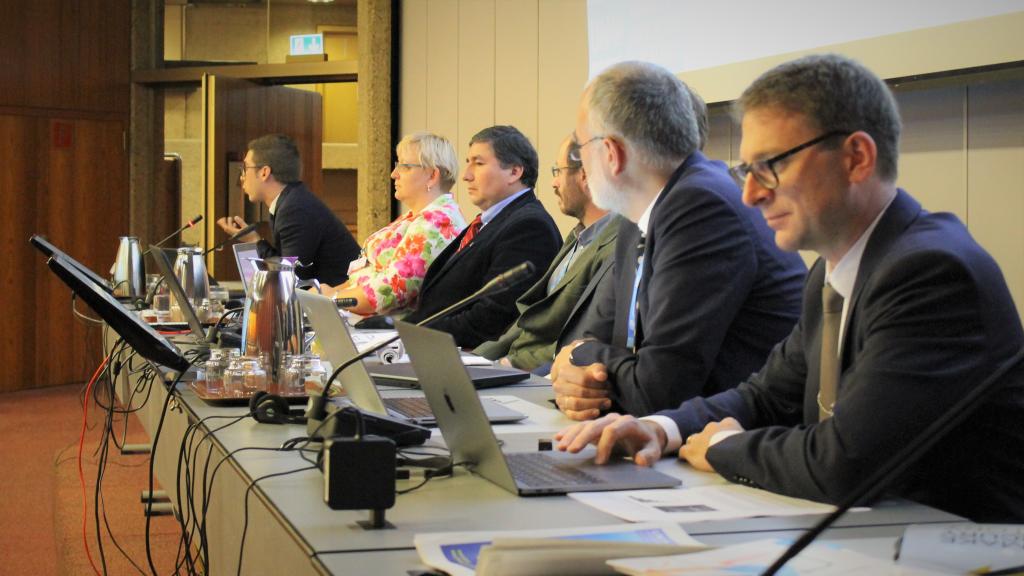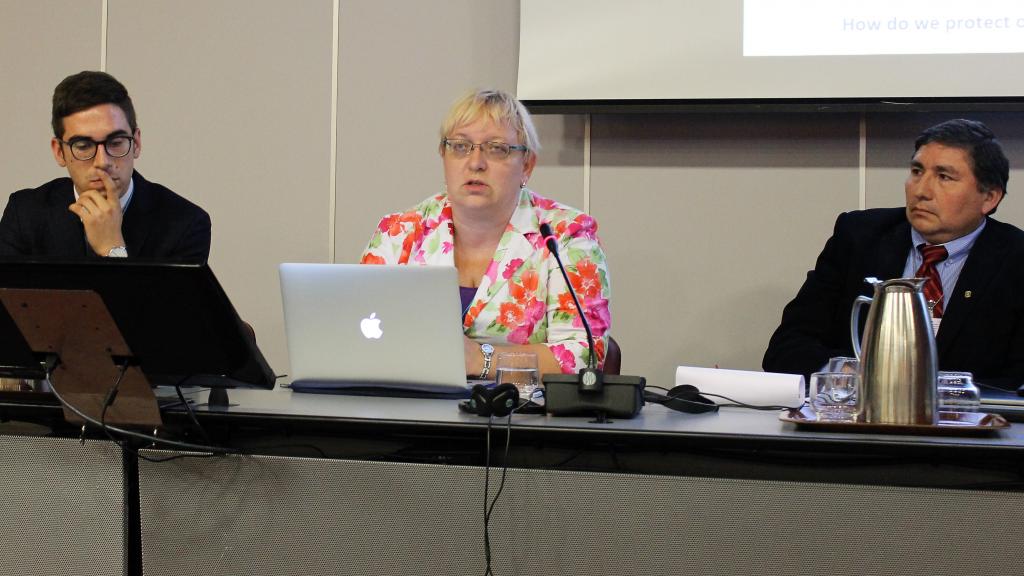The First Conference of Parties (COP) to the Minamata Convention
24 to 29 September 2017, Geneva, Switzerland - with over 1,000 participants from around the world. Named after the case of industrial pollution in Minamata, Japan, where the continued release of mercury in industrial wastewater caused over 2000 deaths, the Minamata Convention is a global treaty established to protect human health and the environment from the adverse effects of mercury. The Minamata Convention entered into force on 16 August 2017, with 83 Parties ratifying the Convention (as of 25 September 2017).
 UNITAR’s Chemicals and Waste Management programme took an active role in this historic event. Coordinating closely with fellow UN Organizations, the OECD and other partners, UNITAR participated in many of the conference’s events, such as knowledge labs, showcase events, and clinics. In particular, colleagues participated in panel discussions and presentations addressing: mercury inventories, focusing on the challenges and opportunities associated with developing them; estimates of emissions and releases into the environment; collection of information on artisanal and small-scale gold mining (ASGM), formalization of ASGM and its link to conflict-affected areas; responsible mineral supply chains; expert demonstrations of the UN Environment Mercury Inventory Toolkit; and comprehensive discussions on the protection of human health and the environment from mercury pollution.
UNITAR’s Chemicals and Waste Management programme took an active role in this historic event. Coordinating closely with fellow UN Organizations, the OECD and other partners, UNITAR participated in many of the conference’s events, such as knowledge labs, showcase events, and clinics. In particular, colleagues participated in panel discussions and presentations addressing: mercury inventories, focusing on the challenges and opportunities associated with developing them; estimates of emissions and releases into the environment; collection of information on artisanal and small-scale gold mining (ASGM), formalization of ASGM and its link to conflict-affected areas; responsible mineral supply chains; expert demonstrations of the UN Environment Mercury Inventory Toolkit; and comprehensive discussions on the protection of human health and the environment from mercury pollution.
 Of particular note, the final day’s panel discussion was moderated by UNITAR, with participants from UN Environment, the Global Environment Facility’s (GEF) Scientific and Technical Advisory Panel, and the Research Centre for Toxic Compounds in the Environment. The panel covered important aspects of mercury management, including: the Global Mercury Assessment and how it helps identify priority sectors and interventions; national inventories of mercury; the GEF/UN Environment Global Monitoring Project and the role of human biomonitoring in policy development; the Global Mercury Knowledge Platform to share date on mercury levels in the environment; and the ASGM National Action Plan projects focusing on formalization of workers and socio-economic studies.
Of particular note, the final day’s panel discussion was moderated by UNITAR, with participants from UN Environment, the Global Environment Facility’s (GEF) Scientific and Technical Advisory Panel, and the Research Centre for Toxic Compounds in the Environment. The panel covered important aspects of mercury management, including: the Global Mercury Assessment and how it helps identify priority sectors and interventions; national inventories of mercury; the GEF/UN Environment Global Monitoring Project and the role of human biomonitoring in policy development; the Global Mercury Knowledge Platform to share date on mercury levels in the environment; and the ASGM National Action Plan projects focusing on formalization of workers and socio-economic studies.
 As the first COP to the Minamata Convention came to a close, great progress was made in the global management of mercury emissions and releases. Major outcomes of the COP included significant pledges to a trust fund for mercury management, a decision on the location of the secretariat (in Geneva for the next year), the programme of work for the secretariat, and renewed commitment to sound management of mercury.
As the first COP to the Minamata Convention came to a close, great progress was made in the global management of mercury emissions and releases. Major outcomes of the COP included significant pledges to a trust fund for mercury management, a decision on the location of the secretariat (in Geneva for the next year), the programme of work for the secretariat, and renewed commitment to sound management of mercury.
UNITAR supports countries to strengthen their national capacities to manage mercury and comply fully with the national obligations of the Minamata Convention. Areas of support include: capacity-building and training, ratification of the Convention, policy reform, development of National Action Plans for artisanal and small-scale gold mining (ASGM) and Minamata Initial Assessments, and phase-out activities. UNITAR also coordinates training on inventories, in coordination with UN Environment (see http://mercurylearn.unitar.org/), and publishes information on its activities at http://mercury.unitar.org/site/home.
For broader activities that relate to mercury, UNITAR supports capacity building on the Globally Harmonized System of Classification and Labelling of Chemicals, and Pollutant Release and Transfer Registers, and has also coordinated the development of the Chemicals and Waste Platform (http://chemicalsandwaste.org/).
Photo 1: UNITAR attending and moderating the showcase event on protecting ourselves and the environment from mercury pollution
Photo 2: Jost Dittkrist of UNITAR moderating the discussion
Photo 3: Dr. Kateřina Šebková of RECETOX discussing human biomonitoring

